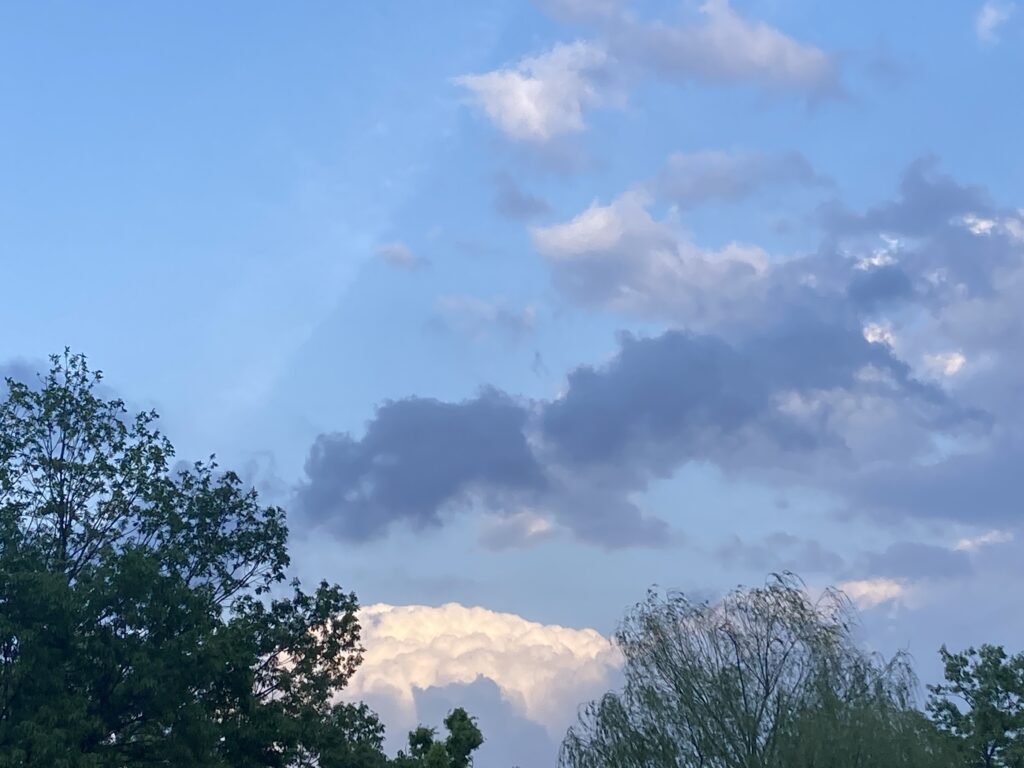Finally, fall. I roll the bike out of storage. Like the grass underfoot, the air is cool to the touch. I ride down a maple-lined street to the corner store, where I buy freshly roasted coffee beans and freshly baked bread. The sun sets between four and five. I climb up a paved hill, to the bridge over the tracks. I watch the cloud banks recede into the distance. I lean against the railing. I give it time.
I remember how easily I could fall in love. As an adolescent pustule, any glance in my direction was immediately captured, bathed in preservative, pinned between two jeweled panes of glass, then catalogued and forever hoarded in a sharp-edged, silver Rolodex. I never talked to anyone in the flesh world, but, in the paradise inside my brain, I was as voluble as a hyena, as capacious as the moon. Anything could vex me. Anything could captivate me. There was some quality that I locked onto—not beauty, not intelligence. Some grist of identity. In the chilled air of the basement, framed in the wooden doorway, one shoe on the bench, a turn of the head. Against the low bed, the early evening in late summer, a certain angle of the light on a bottle-green eye. A stray comment that could be interpreted, charitably, in my favor; only years later, sleeping with our hands and feet pressed together, do I realize it was never intended for me. Now, if the mood is right, I can depersonalize this same inclination for easy infatuation and bring it, instead, to the linked and varied charms of the world. I walk home, feeling a cherry-red hand lingering on my back. I take a breath. Its fingers trace a wobbly heart over my shirt.
I get older. It’s a truism, but pay attention. Every day that passes, I get older. I refuse to think of this as anything other than a privilege. I’m a woman, not a nymph. I am determined to resist any call to fetishize my own youth, which was emaciated then and is rotten now. You know that I am not nostalgic. My adolescence was documented in unsmiling photos, pained videos, and here, in tragic diary entries. When I relive it in dream, we, my heart and I, understand that it was nothing to celebrate. I’m a woman, not a calyx. I’m a woman, not a chalice. I will happily age, but I won’t be devoured by time. It’s a futile complaint, but make no mistake. I’m not a mother; it’s hard enough to be a daughter, a wife. Of blood plasma, of the skin of the dauphine, of green meconium fluid, I know nothing. I have ten good years left, and then, once those years are gone, once the petals have all wilted, I’ll have the rest of my life, which will be fully mine. Good riddance.
I grasp at the reeds. I rip them out. Handfuls of straw-like, saffron-colored light. I don’t respect nature. What? I don’t. I trample over it with the all the peachy, preachy eagerness of ignorance. But I can’t discard the influences that made me so easily. Cheek against the cold dirt, lying in the dew-wet grass, yellowing already, I am close enough to the signs to finally read them. They are dug into the ground. They are carved into every brick of my body. I can’t scratch them out without risking the foundation. Can I live with all these emblems of vice, virtue and sacrifice? Can I bear them without resorting to terror, to prayer? The rest of my life. Oh. Oh, no. What if something bad happens? What if something bad happens? What if something bad happens? What I would give to be free of this specific, shining pain. I’ve been waiting nearly a decade for the knife to drop. When it does, I imagine I’ll feel relief, then grief, then relief, again. The blade will lie uselessly on the floor. But then again, let’s be honest. Take my face into your hands. It’s more likely, isn’t it, that the hurt will be grander and fiercer than I can even imagine today. It will pierce me in a way that I cannot picture. If that’s the case, then what could be the point of all this waiting-in-preparation?
The light sighs, then chokes. Red, orange and pink run across my view, long, faint, flecked, like spittle. The temperature of the air, the rumbling of the train below, the twisted color of the sky, the flushed luster on everything. For a second, the stiches open. The door yawns wide enough for me to latch tightly onto a specific feeling. What I feel, then, is the power and the brevity of my life. I feel its madness, its divinity, its profound stupidity. I feel it tumble over me, like a playful wave. I feel its scarred simplicity. Then, as though struck, the feeling snaps away, and, lacking the instinct to fight for it, I lose it immediately. The wind takes it over the railing, the tracks, the bridge, into the distance.
When did I start writing this like a manifesto? Will the pretensions of my ego, many-winged, never cease? Finally, fall.
